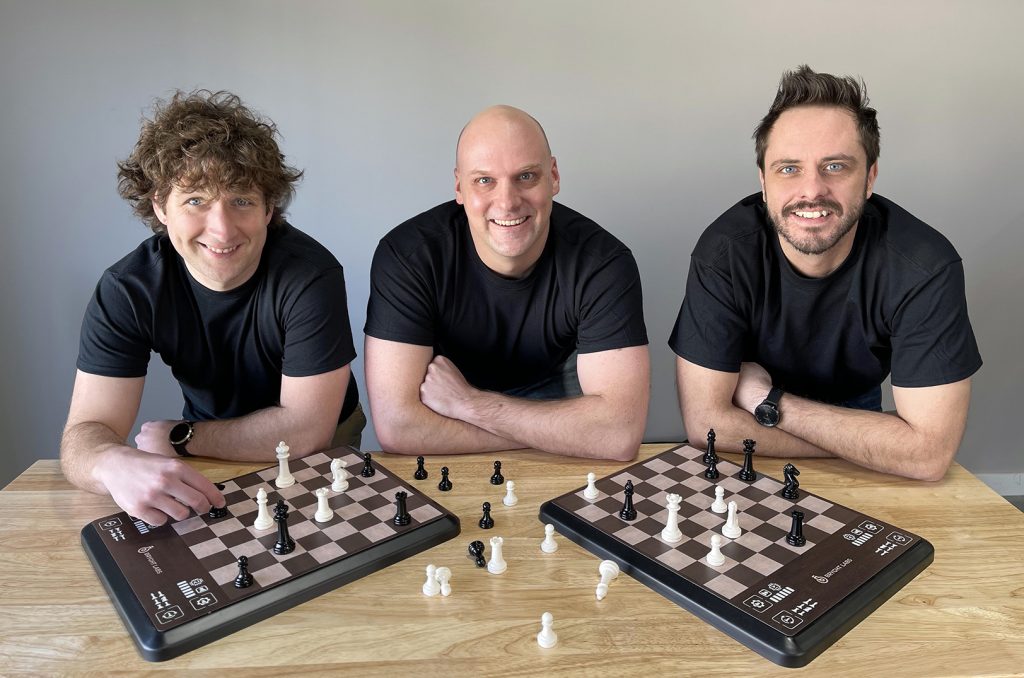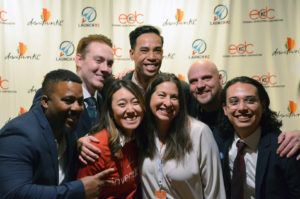Fresh off a successful appearance on “Shark Tank,” Olathe-based connected gaming startup Bryght Labs hopes to capitalize on that exposure to build momentum, said founder and CEO Jeff Wigh.
Wigh and co-founder Adam Roush were featured on an episode that aired in December, pitching their product ChessUp, a patented chess board that uses AI technology to help players learn the game and improve their skills.
“The show airing was a great positive for the company because it gives exposure to the product, so that was fantastic,” Wigh said. “Going on ‘Shark Tank’ was great for the product, good for sales, and we even get the benefit of more traffic on our website every time it re-airs.”
Interest in ChessUp spiked so much, Wigh said, that the company sold out of its product.
“The next milestone for us is actually having the supply chain stocked and stuffed to where we’re not running out of stock,” Wigh said. “Once we do that, ChessUp has kind of become self-sustaining. It sells, we feed that money back in inventory, it sells more. That has now become what we call the cash cow product that supports Bryght Labs.”
Sounds of expansion
The distinction between ChessUp and Bryght Labs is an important one, Wigh noted, describing Bryght Labs as an innovation lab that aims “to spit out many products,” including ChessUp.
The company plans to continue iterating ChessUp, he said, while also turning its attention to new markets in the hobby, game, and sport space.
“We’re very much into these assisted learning or STEM games, music, art, those kinds of markets,” Wigh said. “Where do we go next? All of that’s in-bounds. … I think one of the most attractive ones is music. What can we do with smart instruments?”
Describing a smart instrument as “something that digitizes play” and helps people learn a skill, Wigh drew a parallel between smart instrument technology and the AI learning technology that powers ChessUp.
“The same thing can be applied to learning piano, can be applied to learning guitar, can be applied to learning any instrument,” he said. “The first step is to integrate and seamlessly be able to record the play — and not just the notes, there’s qualitative things in terms of timing, position, pressure.”
“That’s the kind of stuff that we would want to investigate,” Wigh continued. “We want to take that idea a little further by collecting data that can actually be processed and then returned to the user with applicable improvement steps.”
From idea to innovation
Wigh, Roush, and Justin Farrell founded Bryght Labs in 2019 after meeting through their work at Garmin, where they conducted technology research that led to new products and markets, Wigh said.
That experience was invaluable to their entrepreneurial journey, Wigh added, noting that the trio was able to witness the life cycle of ideas and products, including many that were ultimately unsuccessful.
“We got to see all of the product ideas within Garmin that succeeded and failed, and you start to kind of form instincts as to what is a good idea, what is a bad idea, what is the riskier one, what is the safer play,” Wigh said. “You can’t replace the number of times at-bat we got to see while we were there.”
Those “at-bats” instilled the founding trio with the belief that they could overcome the adversity that inevitably hits during product development, Wigh said, including as they were creating ChessUp.
“We came in with confidence that we could pull this off, and that really sees us through some of the harder periods of product development,” he said. “The prototype’s not working, it’s late, the cost is rising — all these things you face when you go from idea to release, we’ve been through it before. … We had the experience that we leaned on from Garmin to be able to trudge through that.”
Bottom line boosts
In addition to appearing on “Shark Tank,” Bryght Labs has been receiving local recognition, support, and funding, including a $50,000 non-dilutive grant from LaunchKC in November.
While acknowledging his gratitude for the grant and noting that “every bit of capital matters,” Wigh said that the even more valuable benefit on LaunchKC has been the mentorship.
“We have mentors when we need marketing help, mentors when we need legal help, mentors when we need to talk through business strategy,” he said. “That’s really, I think, the stronger part of the program is that connection.”
Wigh also offered a shout out to Digital Sandbox KC — from which Bryght Labs received funding in summer 2021 — and Tech Venture Studio as integral networks that support entrepreneurship in Kansas City.
“Kansas City has awesome support in this pre-seed stage where there’s great networks, there’s all sorts of grants available, and we’ve used all of it,” he said. “It’s been instrumental in getting us from idea to launch.”
Bryght Labs — as well as Columbia-based startup Healium — recently was announced as an investment recipient from the Missouri Technology Corporation’s IDEA Fund. While the exact funding amount for Bryght Labs was not released, the backing was part of a $2 million traunch from the U.S. Department of Treasury’s State Small Business Credit Initiative (SSBCI) equity investments program.
“Missouri’s vibrant startup and entrepreneurial community is a critical source of innovation that will drive tomorrow’s economic growth,” said Maggie Kost, acting director of Missouri’s department of economic development, which is administering SSBCI funds through MTC. “We’re pleased to assist emerging businesses through strategic investments that will create more opportunities for Missourians and secure a more prosperous future.”
Click here to read more about the $2 million in IDEA Funds that recently were awarded this quarter.
As Bryght Labs receives more orders for ChessUp — available for purchase on the company’s website and Amazon — Wigh encouraged other product-based companies to take advantage of the e-commerce model that allows them to be their own retailer.
“These e-commerce platforms have opened up the ability for us to be the retailer as well, and we sell most of our volume through our own website,” Wigh said.
“It’s never been easier to actually go to live sales — to get a product, and take an order, and process a payment, and get it to the customer,” he continued. “Whether you’re making 10,000 of something or 10 of something, you can be a product-based company with a much smaller staff now. You can launch much sooner. So I encourage anybody who has these ideas, there’s no better time than right now.”











































